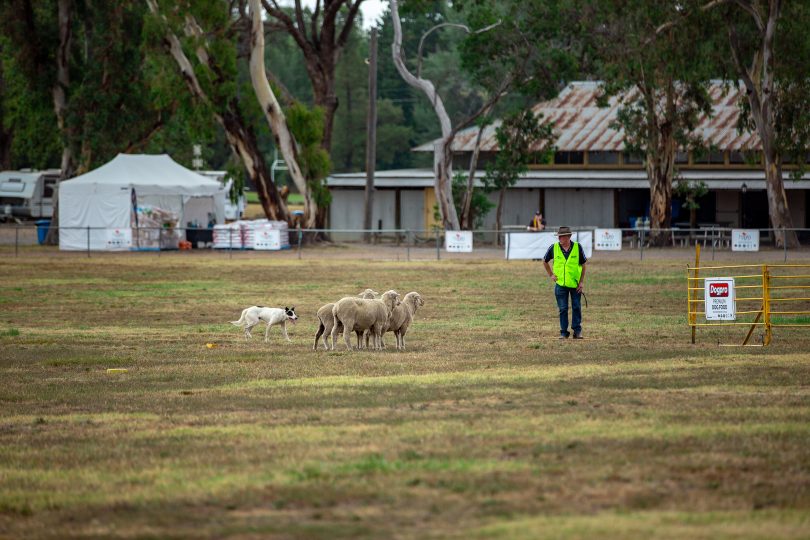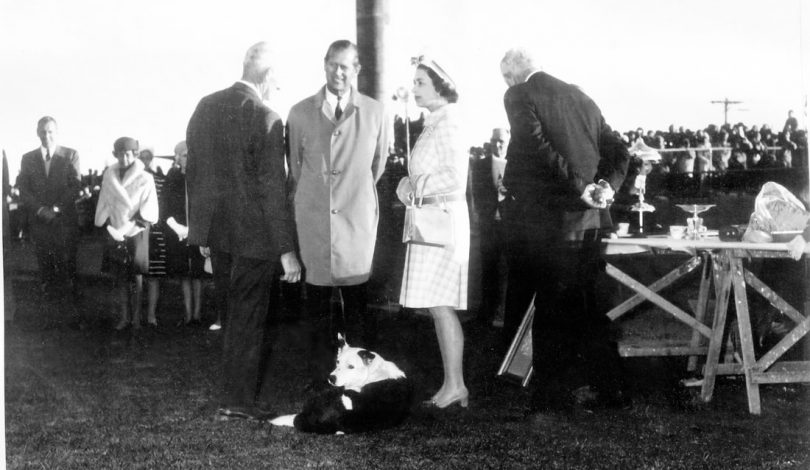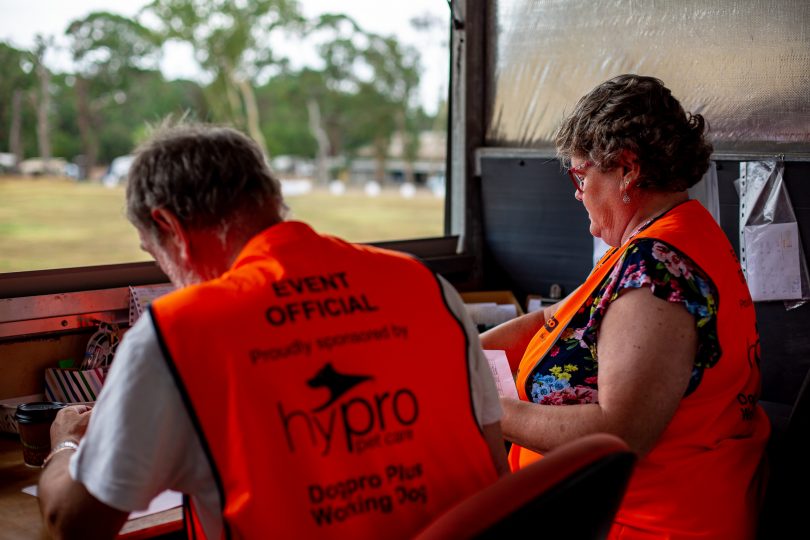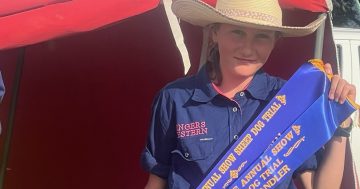
Longtime National Sheepdog Association president Charlie Cover with trainee sheepdog Nan. Photo: George Tsotsos.
At the Hall showground, everyone is concentrating intensely. Spectators, dog handlers, timekeepers and most of all the dogs – all except for young Nan, who is energetically digging her way to China, seemingly unaware of her future as the Next Big Thing in sheepdog trials.
The National Sheepdog Trials, being held at Hall until Sunday (17 March), are the most significant of their kind in the country, and observing them is a little like watching chess but with dogs and sheep. I’m looking at Bungendore veteran (and butcher) Paul Darmody working three edgy wethers, whom his dog must bring around the course, worked at a steady pace by his handler.
He’s one of 55 handlers who are working 250 dogs over the week of the competition. Contestants have come from around Australia and include state and supreme champions.
It’s a fine art: if the sheep stray outside an 8m corridor on the course, points are lost. The handler cannot change his own pace, the dog is constantly alert to every movement and the sheep – well the sheep could literally do anything. There’s a bridge, a sheep race, and a pen to get through. Contestants have 15 minutes to complete the course and 100 points to lose.

Sheepdog trial in action at the Hall Showground. Photo: George Tsotsos.
“Ideally, the dog stops and introduces himself to the sheep,” says Sarah Sydrych from the National Sheepdog Trial Association. “The sheep are weighing up whether they’re in danger or they’ll work with the dog.
“You’re looking for a dog with masses of instinct and biddability so they respond to the commands. The best dog for this kind of work is calm but bold. You could take a young dog and put them on a property and they’d be as good a working dog as the others.”
It’s a tricky, technical skill according to Eileen Moriarty (who bred the deliciously cuddly Nan). And, she says the trials have a long and distinguished history. They began in 1943 when George Westcott, a patriotic public servant, wanted a distinctly Australian fundraiser. The first trials were held at Manuka Oval and Westcott built the event into the most prestigious in Australia.

HM Queen Elizabeth visits the National Sheepdog Trials during the EPIC days. Photo: Supplied.
When Manuka became unworkable, the trials moved to EPIC where HM Queen Elizabeth spent a dusty, windy afternoon in the mid-seventies watching the trials happen in a bare paddock before presenting a silver tea-service to the winners (the current committee are hoping someone might know where the tea-set is).
The trials have been held at Hall for the past quarter century and the history is what’s kept Association president Charlie Cover involved. He’s also the new owner of young Nan, whose future beckons on the showground.
“This is the trial that everyone wants to win. There are plenty of other trial competitions but none of the others have the depth. From a competitive point of view, this is the only way you can compare with the greats of the past,” he says.

Timekeepers and commentators volunteer at the National Sheepdog Trials. Photo: George Tsotsos.
Charlie’s father before him was a sheepdog trialler, but he’s noticed a change over the years in the demographic. In the past, most participants either worked on or owned land, while these days there are many more people who run small acreages and may not own sheep at all.
Charlie reckons that’s the way of the future as the National Sheepdog Trial Association works out how to stay relevant and engaged so the grand tradition continues to flourish. He’s hopeful that sparking up the commentary and involving more city dwellers might do the trick.
“We need spectators to rebuild the trial,” Eileen says. “It’s so deep in our heritage and it connects the bush with the city. The more people we can bring along, the more we can rebuild to its glory days.”
The National Sheepdog Trials are being held at the Hall Showground until Sunday. Entry by donation.
Original Article published by Genevieve Jacobs on The RiotACT.








